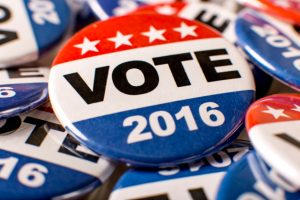 * In the event that the election ends in a deadlock, will the Supreme Court be able to resolve the dispute even though the highest court in the land is currently split 4-4 down ideological lines? No one knows, and that’s “[one] hell of a scary thought.” Not to worry, because there’s a “low probability” that the Supreme Court would have to decide the winner of the 2016 election — “[b]ut if it does happen, it surely won’t be good.” How comforting! [POLITICO]
* In the event that the election ends in a deadlock, will the Supreme Court be able to resolve the dispute even though the highest court in the land is currently split 4-4 down ideological lines? No one knows, and that’s “[one] hell of a scary thought.” Not to worry, because there’s a “low probability” that the Supreme Court would have to decide the winner of the 2016 election — “[b]ut if it does happen, it surely won’t be good.” How comforting! [POLITICO]
* The Supreme Court refused to step into a legal battle between the Ohio Democratic Party and the Trump campaign over voter harassment with no dissents, save for a comment from Justice Ruth Bader Ginsburg, who noted that because she was “mindful” of existing Ohio law prohibiting voter intimidation, she was denying the request. Thanks to the Notorious RBG for the reminder not to participate in illegal activities. [Slate]

How Innovative Legal Teams Are Turning AI From Promise To Practice
In recent years, AI has moved beyond speculation in the legal industry. What used to be hypothetical is now very real.
* Martin Shkreli thinks he’s going to be able to clear his name by forcing Katten Muchin to turn over three years’ worth of documents from the time the firm represented him, with his new attorneys claiming he acted in good faith because he “sought and received his lawyers’ advice and he followed it.” The firm isn’t thrilled about the prospect of having to hand over hundreds of thousands of pages of documents. [Big Law Business]
* The institution formerly known as the South Texas College of Law has unveiled yet another new name after being enjoined from using the name Houston College of Law. The school will now be known as the South Texas College of Law Houston. Your tuition dollars at work: It seems like the school wasted an incredible amount of money to come up with a name substantially similar to its original name. Congrats? [Houston Chronicle]
* The Law School Admission Council recently published a report on the different methods test-takers used to prepare for the LSAT, and it seems that the biggest ground-breaking takeaway from the data is that those who actually studied scored much better on the exam than those who did not. In addition, those who used official LSAC materials and commercial preparation courses fared better than self-studiers. [U.S. News]

Stand With Survivors: Legal Tools To Make A Real Difference This DVAM
Enhance your legal skills to advocate for survivors of intimate partner violence.
 Staci Zaretsky is an editor at Above the Law. She’d love to hear from you, so feel free to email her with any tips, questions, or comments. You can follow her on Twitter or connect with her on LinkedIn.
Staci Zaretsky is an editor at Above the Law. She’d love to hear from you, so feel free to email her with any tips, questions, or comments. You can follow her on Twitter or connect with her on LinkedIn.